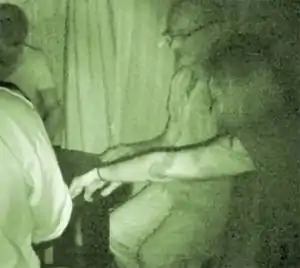Stephen E. Braude
Stephen E. Braude (1945–) is an American parapsychologist and pseudoscience promoter with Spiritualist beliefs.[1][2]
| Putting the psycho in Parapsychology |
| Men who stare at goats |
| By the powers of tinfoil |
v - t - e |
Parapsychology
Braude is a retired professor from the University of Maryland, Baltimore County with a Ph.D. in philosophy who has championed the idea that scientific evidence for mediumship and psychokinesis exists. As one might guess, Braude is the Editor-in-Chief for the ultra-woo Journal of Scientific Exploration and was a past President of the Parapsychological Association.[3]
Braude's parapsychological work has been criticized for promoting pseudoscience, and scientists have written that his claims of psychokinesis being scientifically proven are based on assumption rather than scientific evidence.[4] Braude's apparent response to such criticism is to speculate that standard scientific method may not be able to effectively measure psychic stuff:
“”The problem is there's no such thing as a controlled experiment in parapsychology. If you take parapsychology seriously enough to study the evidence for psi, in principle you're studying a phenomenon which, if it exists, can circumvent any experimental controls you might want to impose. |
| —Stephen E. Braude, interviewed by Skeptiko [5] |
Not surprisingly, Braude also maintains that eyewitness accounts are really the best proof that paranormal phenomena is real. Maybe that's why Braude believes the infamous "I can only perform when drunk" bellhop Ted Serios had the genuine psychic ability to create images on photographic film, even though magicians thoroughly exposed the sleight of hand tricks he used to create his illusions.[6][7][8][9]
Spiritualism

Braude has a special affinity for Spiritualism. He believes mediums like Eusapia Palladino, Daniel Dunglas Home, Gladys Osborne Leonard, Leonora Piper and the Schneider brothers had genuine paranormal abilities, and that ectoplasm is real. Like most Spiritualists, Braude studiously ignores instances when mediums are caught with their knickers down (literally[note 1]), ectoplasm made out of cheesecloth, or plastic dolls passed off as spirit manifestations. Because of this stubborn denial (or perhaps gullibility), he's gotten a reputation for closing his eyes to things that might tend to disprove the paranormal. He's drawn criticism from Antony Flew,[10] and Journalist Wendy Grossman clarified the issue in her review of Braude's The Limits of Influence: Psychokinesis and the Philosophy of Science (1986):
“”[Braude] accuses sceptics of ignoring the evidence he believes is solid, but himself ignores evidence that does not suit him. If a medium was caught cheating on some occasions, he says, the rest of that medium's phenomena were still genuine." |
| —Wendy Grossman, New Scientist, Volume. 130. Issue 1768[11] |
Kai Muegge
Naturally, part of Braude's serious scientific research into mediumship involves participating in the occasional séance.[12] While attending the Felix Circle seance with Spiritualist Kai Muegge in Germany, Braude was captured in a rather embarrassing video showing himself and other sitters "levitating" a table. There's also a hilarious photograph of a séance sitter puking out some fake ectoplasm. Of course, there were no scientific controls in place, but maybe that's the way Braude likes it.[13]
According to Braude there is "confirmed" evidence that Kai Muegge has cheated at his séances.[14] Muegge even confessed to utilizing an LED device to produce fake "spirit" lights. However, despite the evidence of fraud Braude believes "some of Kai’s phenomena seem quite clearly to be genuine".[14]
Publications
- ESP and Psychokinesis: A Philosophical Examination (1979)
- The Limits of Influence: Psychokinesis and the Philosophy of Science (1986)
- First-Person Plural: Multiple Personality and the Philosophy of Mind (1995)
- Immortal Remains: The Evidence for Life after Death (2003)
- The Gold Leaf Lady and Other Parapsychological Investigations (2007)
Notes
References
- Wendy Grossmann. (1991). Dismissal is not disproof. New Scientist. Volume. 130. Issue 1768, p. 53.
- Chris French. (2008). The Gold Leaf Lady and Other Parapsychological Investigations by Stephen E. Braude. The Psychologist. Volume 21. pp. 398-399.
- Stephen E. Braude Biography
- Ronald N. Giere. (1982). ESP and Psychokinesis: A Philosophical Examination by Stephen E. Braude. The Philosophical Review. Vol. 91, No. 2 (Apr., 1982), pp. 288-290. Patrick Grim. (1989). The Limits of Influence: Psychokinesis and the Philosophy Of Science by Stephen E. Braude. Nous. Vol. 23, No. 1. pp. 126-136.
- Interview with Stephen E. Braude Skeptiko
- Reynolds, Charles. (1967). An Amazing Weekend with Ted Serios. Part I. Popular Photography (October): 81–84, 136–40, 158.
- Eisendrath, David. (1967). An Amazing Weekend with Ted Serios: Part II. Popular Photography (October): 85–87, 131–33, 136.
- Len Peyronnin. (2011). Psychic Projections Were a Hoax. The Chronicle of Higher Education. "Anyone who knows anything about this issue knows that Mr. Serios was long ago exposed and thoroughly debunked as a fraud. This was done with absolute certainty by professional photographers Charlie Reynolds and David Eisendrath in the October 1967 issue of Popular Photography. Serios was observed, when he thought no one was looking, sticking pictures into his "gizmo," a tube he held between his head and the camera lens. That some claim he produced images without the tube, and at some distance from the camera, is easily attributed to double exposure or use of previously made exposures, followed by the fake snapping of a picture."
- Terence Hines. (2003). Pseudoscience and the Paranormal. Prometheus Books. p. 77
- Antony Flew. (1988). The Works of William James: Essays in Psychical Research by F. Burkhardt; F. Bowers; The Limits of Influence: Psychokinesis and the Philosophy of Science by Stephen E. Braude. Philosophy and Phenomenological Research Vol. 49, No. 2. pp. 353-357.
- Wendy Grossmann. (1991). Dismissal is not disproof. New Scientist. Volume. 130. Issue 1768, p. 53.
- Stephen Braude at the Felix Circle
- Felix Circle Photographs
- Braude, Stephen E. (2016). Follow-Up Investigation of the Felix Circle. Journal of Scientific Exploration 30 (1): 27-55.